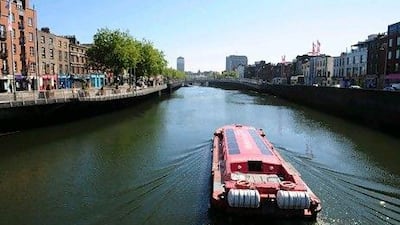Ireland is small, which makes it an easy country in which to navigate and meet people.
Q&A:Days are longer so you won’t be caught short
What currency is used in Ireland? Unlike the neighbouring UK, Ireland is part of the euro area, and its currency is the euro. The country joined the euro in 2002 in part to attract foreign businesses interested in a low-tax, low-cost hub for doing business with the rest of Europe.
Where are the most popular tourist destinations in Dublin? The city is littered with them, and tourists flock to Dublin in the summer. The most heavily trafficked area is the Temple Bar neighbourhood in the centre of the city, a network of footpaths with scores of restaurants, pubs and shops.
What is the weather like? Ireland's climate is often pleasant, but it rains a lot. So bring an umbrella. The best time to go is without question the summer, when temperatures are most bearable. If you go between June and August, do not expect the sun to set until at least 9pm.
Is it smart to rent a car? Sure. The traffic in Ireland is by and large orderly and calm, and car hire is relatively inexpensive. Renting makes sense if you plan to take long trips across the country, or if you simply prefer the extra freedom.
Dublin may be the centre of the country's commercial life, but there is plenty of vibrancy in smaller cities including Galway and Cork on the west, which are only a few hours' drive from Dublin. The views across the countryside from Dublin are gorgeous, replete with sheep-dotted pastures and horse stables that emerge as the eastern flatlands give way to the hilly west.
Most business travellers, however, will probably spend the bulk of their time in Dublin. And where to stay in the capital is not a tricky choice. There are a wide range of suitable options and the place is relatively safe. It is probably wise, though, to choose a hotel near where you will be spending most of your time, because taxis are expensive. A ride across town could easily run you €20 (Dh105.75) or €30 - a bit rich, even if you can expense the fares.
Another factor to consider is your proximity to public transportation, as a nearby train or bus stop can make getting to and from meetings a snap. Dublin's new Luas tram system makes getting around the city especially easy.
If your main business lies in Dublin's financial district, the Gibson Hotel is a good choice. A double room will set you back about €100 a night, and it is right next to a Luas stop that bisects Dublin's International Financial Services Centre. If you want to be closer to the city centre, the Hilton hotel in Dublin 2 is a good choice, as are the fancier places that ring St Stephen's Green.
Top 5: Restaurants in Dublin for business meetings.
1 Dax Restaurant, 23 Pembroke Street Upper.
2 The Pig's Ear, 4 Nassau Street, Dublin 2.
3 The Larder, 8 Parliament Street.
4 Il Vicoletto, 5 Crow Street, Temple Bar.
5 The Blackboard Bistro, 4 Clare Street.
Source: TripAdvisor
Entertaining clients in the city is as easy as choosing a hotel, although your best bets probably lie outside areas packed to the gills with tourists. For an informal and solidly Irish meal, The Pig's Ear is a good pick. But Dublin is teeming with all kinds of cuisines, and boasts some very good Italian and French restaurants. They include the Blackboard Bistro, a cosy French place, and Il Vicoletto, an Italian spot worth checking out even though it is in the bustling Temple Bar neighbourhood.
The Quote: "Ireland. Great for the spirit – very bad for the body." Hugh Dancy, English actor

